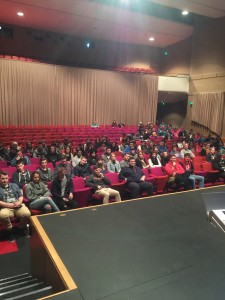This week, my university welcomed around 500 new students to university life as part of the mid-year intake.
As a member of the senior executive team, my small contribution is to provide an official welcome at the largest campuses from a lectern on a stage to a sea of student faces.
 I can see as the students file into the auditorium where we will address them, that many are nervous. Their eyes are often focused on the ground in front of them, flicking up occasionally to look around briefly, before lowering again to a place of relative safety. The tension as they take their seats is palpable.
I can see as the students file into the auditorium where we will address them, that many are nervous. Their eyes are often focused on the ground in front of them, flicking up occasionally to look around briefly, before lowering again to a place of relative safety. The tension as they take their seats is palpable.
University Orientation talks can be a series of briefings from Very Important People about Very Important Things, that I imagine can be quite dry and somewhat unhelpful for a nervous new student.
I like to think we do it differently and we do it well at my uni. For example, we employ a troupe of our later year Performing Arts students to write, act, dance, sing and perform a short production that introduces our new students to the major things they need to know, but in a memorable and engaging way. New students find themselves entertained, laughing, clapping and smiling, while being informed about the importance of attending class, encouraged to use the counselling service and offered suggestions for how to make friends.
Inspired by the remarkably high quality productions from our Arts Academy students, this year I decided to step away from the lectern and my pre-prepared notes about various things new students should know, and should and shouldn’t do.
I spoke directly to the students and asked them instead to consider whether they were worried about anything as they started their university journey. I asked them to take the piece of paper they had been handed as they came in and use the pen provided to anonymously jot down what their major worries were.
I then asked them to scrunch up the piece of paper and throw it at me as I stood on the stage. I had to repeat the instruction a few times before the first brave student threw her paper at me. Soon the arcs of paper filled the front of the room.
I selected half a dozen or so from the floor, un-scrunched them and read them out. This served the purpose of normalising a worry that an individual student might have when they saw that others had the same concern. I then suggested a service, mechanism or tip that might help with the particular concern.
 With the help of several colleagues, I then gathered all of the pieces of paper and took them back to my office to read, to ensure we are covering off all major concerns with our suite of support services, programs, approaches and staff. I email a summary of the main concerns to relevant colleagues.
With the help of several colleagues, I then gathered all of the pieces of paper and took them back to my office to read, to ensure we are covering off all major concerns with our suite of support services, programs, approaches and staff. I email a summary of the main concerns to relevant colleagues.
I’ve been gathering and considering student views on university in one way or another for over 25 years, through formal research, evaluation processes, involvement in designing institutional and national data collection surveys, employing students as staff and listening to their feedback about the student experience, having informal conversations directly with students and yes, I admit it, eavesdropping on student conversations (I didn’t mean to do this the first time but found it so compelling and useful, I confess I have continued at times while queueing for coffee and the like).
The feedback I got this week shows students are worried about similar sorts of things to the things they have worried about over the past quarter of a century at least.
In order of how frequently the matter was raised, the current concerns of students at my university are around:
- academic matters such as how to study and undertake assessment tasks including exams and whether they will pass;
- time management, including – for mature age students – how to ensure they can fit in caring for family, employment, running a house and study and – for the younger students – being worried about how they get out of bed on time for classes and get things done in time;
- social concerns, such as how to meet people, make friends and fit in;
- financial issues such as whether they are eligible for Centrelink and/or other financial assistance and how to afford the textbooks and other costs of study; and
- confidence in their ability to successfully undertake study at university level.
Fortunately, according to graduate feedback collated and provided by the federal government on the Quality of Learning and Teaching website, my university is first in the state of Victoria for quality of teaching and student support, beating seven other universities. I’m quietly confident we have our student concerns covered and can proactively allay most student worries, thereby offering them the best chance of success.
Professor Marcia Devlin is Deputy Vice-Chancellor (Learning and Quality) at Federation University Australia.
